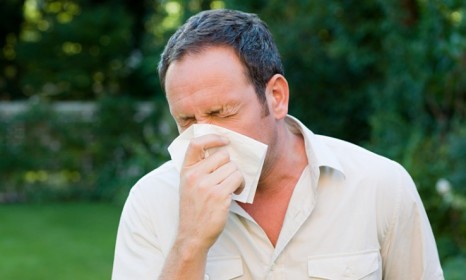Bad allergies: Blame climate change?
Climbing temperatures, melting ice caps... and red, itchy eyes? A new study suggests a link between global warming and allergies

Global climate change may be most closely associated with warmer temperatures and rising sea levels, but it may also be responsible for another (less devastating) scourge: An increase in allergies. A new study from Quest Diagnostics finds that sensitivity to two common airborne allergens is increasingly common, and may be tied to climate change. Here, a guide to the study:
Allergies are on the rise?
They sure are. The number of people afflicted by allergies increased by about 6 percent from 2005 to 2008. And allergies to common ragweed (up 15 percent) and mold (up 12 percent) jumped even more "dramatically," according to the Quest report.
The Week
Escape your echo chamber. Get the facts behind the news, plus analysis from multiple perspectives.

Sign up for The Week's Free Newsletters
From our morning news briefing to a weekly Good News Newsletter, get the best of The Week delivered directly to your inbox.
From our morning news briefing to a weekly Good News Newsletter, get the best of The Week delivered directly to your inbox.
And this is really tied to climate change?
Yes, accordng to the study. As the planet gets hotter, ragweed and mold are better able to thrive, and that prevalence leads to an increase in allergies, says the Quest report. Already, earlier studies had found that the growth of fungal spores increased with rises in carbon dioxide, and that the ragweed pollen season has gotten nearly a month longer since 1995, says Susanne Rust in California Watch. So "if you like it hot, be prepared to suffer the consequences," says Dennis Romero in LA Weekly.
How was this new study done?
Quest examined nearly 14 million blood samples from more than 2 million allergy patients over the course of four years. Quest's blood tests looked for antibodies to 11 common allergens, including ragweed, mold, dust mites, and dog dander. The company says this was the largest allergy study ever done in the U.S.
A free daily email with the biggest news stories of the day – and the best features from TheWeek.com
How common are allergies overall?
They affect 1 in 5 Americans. "Allergies account for more than 17 million physician office visits, 30,000 emergency room visits, and several hundred deaths each year." The study also found that allergies are more prevalent among men than women, and more common among children than adults. Earlier studies had suggested that women suffered more from allergies.
And where are allergies worst?
"In the United States, the western region has been hit the hardest, with the largest increases being seen in California, Nevada and Arizona," says Lynn Walbrecht at Health News. Phoenix, Las Vegas, and Overland Park, Kan., had the highest rates of ragweed sensitivity, while Miami, San Francisco, and Portland, Ore., had the lowest.
Sources: California Watch, Health News, LA Weekly, UPI (2)
-
 31 political cartoons for January 2026
31 political cartoons for January 2026Cartoons Editorial cartoonists take on Donald Trump, ICE, the World Economic Forum in Davos, Greenland and more
-
 Political cartoons for January 31
Political cartoons for January 31Cartoons Saturday's political cartoons include congressional spin, Obamacare subsidies, and more
-
 Syria’s Kurds: abandoned by their US ally
Syria’s Kurds: abandoned by their US allyTalking Point Ahmed al-Sharaa’s lightning offensive against Syrian Kurdistan belies his promise to respect the country’s ethnic minorities